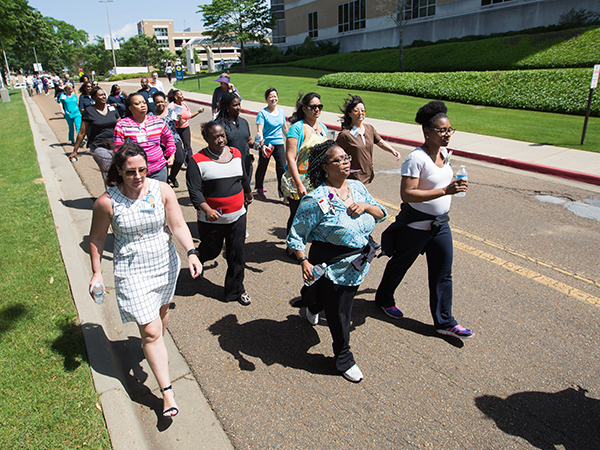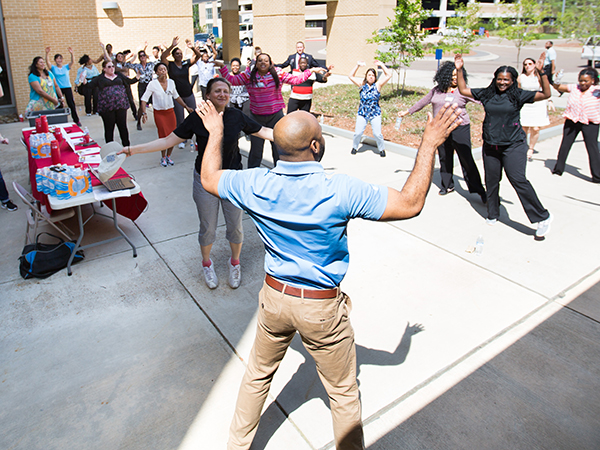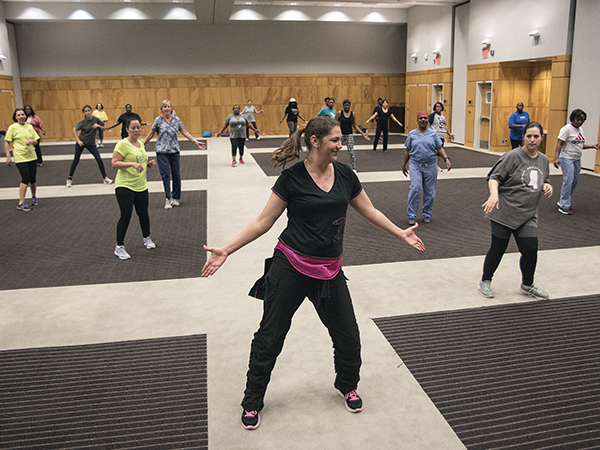Emotional health, not just physical fitness, necessary for wellness

When it comes to overall well-being, Medical Center employees' mental health challenges frequently surpass their physical health problems.
It's a finding that stands out in the recent health risk assessment survey completed by more than 2,000 of UMMC's 10,000 employees earlier this year. On average, employees reported a mean 3.99 days in the prior month when their mental health was “not good,” compared to a mean 2.16 days when their physical health was “not good.”
On top of that, those surveyed reported feeling “worried, tense or anxious” an average 5.63 days the prior month. About 18 percent reported having been diagnosed with depression at some point.

“Mental health tended to be rated worse than physical health,” said Dr. Joshua Mann, professor and chair of Preventive Medicine and chair of the UMMC Wellness Committee. “We need more emphasis on our emotional wellness.”
Research performed by the Kaiser Family Foundation, a national leader in health issues, shows that 31.9 percent of Mississippians said they had “poor mental health” between one and 30 days in the past 30 days. The data is from 2015, the latest reporting period. That compares to 34.3 percent of all U.S. residents polled by Kaiser for the Centers for Disease Control using a random surveillance system.
That percentage further breaks down to a mean 4.5 days that Mississippians reported “poor mental health” in the prior month, Mann said. The data also shows about 18.2 percent of Mississippians were diagnosed with depression at some point - similarly to that reported in UMMC's survey.
The February poll follows an October 2016 workplace wellness interest survey taken by about 2,300 of the Medical Center's 10,000 employees who shared their ideas on making UMMC a place where employees have plenty of opportunities to work on wellness. The key findings: Employees want more emphasis on healthy cafeteria options and new ways and places to exercise on campus.
The Medical Center responded by working with the new food services provider in placing fresh fruit stations around the cafeteria and at checkout stations; adding calorie count information to sandwiches and salads in the cafeteria's grab-and-go section; adding a cafeteria yogurt bar with fresh fruits; and adding nutritional value cards at entrée serving stations that list serving size, calories, total fat and carbs, and protein.
Brea Cole, Preventive Medicine's medically integrated wellness program manager, is taking a lead role in getting employees in exercise mode. She recently placed about 30 signs on elevators across campus that encourage people to take the stairs instead.

Ronald Woods, University Wellness medical integration coordinator, center, leads participants in warm-up exercises before taking a lap around the UMMC campus.
UMMC also updated vending machines with healthier options -- salads, sandwiches, boiled eggs and fruit -- and has placed more emphasis on group campus wellness activities, such as Wednesday's National Walking Day event that attracted students and staff campus-wide.
The walkers included new employee Xavier Johnson, research analyst in the Office of Integrity and Compliance. She's no stranger to wellness; in her former position at the state Department of Health, Johnson served as a worksite wellness champion.
“I'm doing this for two reasons,” Johnson said as walkers prepared for a brisk warm-up exercise led by Ronald Woods, medical integration coordinator with University Wellness. “I have chronic conditions, and this is a way to address them.

Johnson
“And, I did activities like this at the Department of Health. I'm trying to make sure I do the same things while I'm here.”
The newest employee health survey sought additional personal demographic details - for example, an employee's height and weight, age, how often they exercise and whether they smoke or have significant alcohol consumption.
It asked what they believe their health is in general, choosing from excellent, very good, good, fair or poor; how long it's been since an employee visited a doctor for a routine checkup; how much sleep they get; and if they cope with any chronic health problems.
“Our strategy all along was not just to focus on obesity and nutrition, even though those are definitely important,” Mann said.
Mann and Cole are working with the Wellness Committee to fine-tune an action plan to address employee needs voiced in the February survey. Mental health, Mann said, “has been on our radar screen, but this really highlights it. We want to incorporate more experiential activities to reduce stress and improve emotional well-being for our employees. We are fortunate to have excellent resources for accomplishing this, such as mental health experts in the Department of Neuropsychiatry and Human Behavior.”
Just one recent example: Dr. Danny Burgess, director of the Center for Integrative health at the University of Mississippi Medical Center and co-director of the Student Counseling and Wellness Center, recently presented an interactive “Wellness Wednesday” program open to the entire campus on “The Power of Resilience.” Burgess' message: The way you adapt or change in the face of your life's adversity has everything to do with building the resiliency to withstand it.

“People who came didn't want to leave,” Cole said. “They wanted it to last longer.”
Other areas of concern, ranging from stress reduction to the need for physical activity, will be the focus of additional Wellness Wednesday talks. Going forward, sessions will be recorded so that employees who work off campus or on night shifts can benefit from them.
“We really need to work on better reaching our health-care system employees who work different shifts,” Mann said. “We're not reaching those employees as well as those who work daytime hours.”
Spurred by discussions about professional development that took place in the Medical Center's recent 100-day workout, Mann said, plans are to highlight the two-way relationship of physical and emotional wellness with professional achievement and satisfaction. Other resources for employees coping with stress and burnout are available on the UMMC Workplace Wellness website (UMMC log-in credentials required.)
Employees are clamoring for more Zumba classes than the once- or twice-monthly offerings now available on campus, Cole said. It's a matter of finding indoor meeting space that's big enough for a dance group, she said.

Assistant professor of nursing Josie Bidwell (pictured foreground) and Beth Ammons, a registered nurse and patient navigator in pediatric neurology, are leading campus Zumba classes as part of the Medical Center’s emphasis on wellness.
And, Wellness Challenges that focus on more than losing weight are being planned for next month on the main campus, Jackson Medical Mall, Grants Ferry and the Clinton billing office, Cole said.
Preventive Medicine is working on a project voiced by many employees: bringing a farmer's market to campus for easy access to fresh fruits and veggies. That hopefully will materialize before the end of this year, Cole said.
Mann, who came to the Medical Center in February 2015, has significantly moved the needle on workplace wellness by galvanizing the Wellness Committee to give employees the tools to achieve a healthier lifestyle. That's evident in UMMC's performance on the Centers for Disease Control and Prevention's Worksite Health ScoreCard, a tool designed to help employers assess whether they have put into action evidence-based interventions or strategies to prevent heart disease, stroke and related conditions.
The Medical Center in 2016 received 170 of a possible 264 points on the ScoreCard. This year, Mann said, UMMC's score jumped to 228.
“We were able to improve our score because of the tremendous buy-in we've gotten from people across the Medical Center,” Mann said. “But, we still have room for improvement.”


